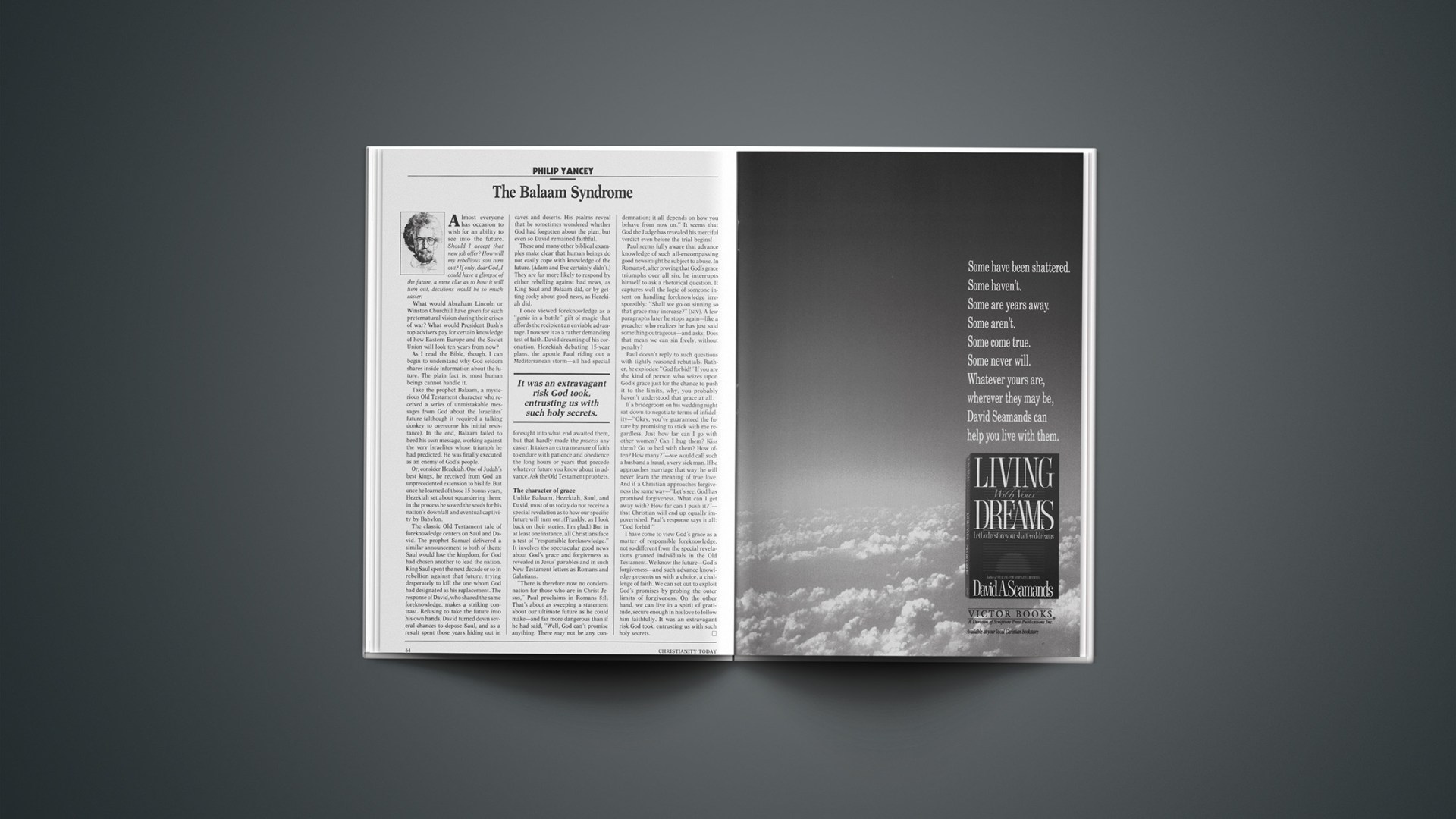Almost everyone has occasion to wish for an ability to see into the future. Should I accept that new job offer? How will my rebellious son turn out? If only, dear God, I could have a glimpse of the future, a mere clue as to how it will turn out, decisions would be so much easier.
What would Abraham Lincoln or Winston Churchill have given for such preternatural vision during their crises of war? What would President Bush’s top advisers pay for certain knowledge of how Eastern Europe and the Soviet Union will look ten years from now?
As I read the Bible, though, I can begin to understand why God seldom shares inside information about the future. The plain fact is, most human beings cannot handle it.
Take the prophet Balaam, a mysterious Old Testament character who received a series of unmistakable messages from God about the Israelites’ future (although it required a talking donkey to overcome his initial resistance). In the end, Balaam failed to heed his own message, working against the very Israelites whose triumph he had predicted. He was finally executed as an enemy of God’s people.
Or, consider Hezekiah. One of Judah’s best kings, he received from God an unprecedented extension to his life. But once he learned of those 15 bonus years, Hezekiah set about squandering them; in the process he sowed the seeds for his nation’s downfall and eventual captivity by Babylon.
The classic Old Testament tale of foreknowledge centers on Saul and David. The prophet Samuel delivered a similar announcement to both of them: Saul would lose the kingdom, for God had chosen another to lead the nation. King Saul spent the next decade or so in rebellion against that future, trying desperately to kill the one whom God had designated as his replacement. The response of David, who shared the same foreknowledge, makes a striking contrast. Refusing to take the future into his own hands, David turned down several chances to depose Saul, and as a result spent those years hiding out in caves and deserts. His psalms reveal that he sometimes wondered whether God had forgotten about the plan, but even so David remained faithful.
These and many other biblical examples make clear that human beings do not easily cope with knowledge of the future. (Adam and Eve certainly didn’t.) They are far more likely to respond by either rebelling against bad news, as King Saul and Balaam did, or by getting cocky about good news, as Hezekiah did.
I once viewed foreknowledge as a “genie in a bottle” gift of magic that affords the recipient an enviable advantage. I now see it as a rather demanding test of faith. David dreaming of his coronation, Hezekiah debating 15-year plans, the apostle Paul riding out a Mediterranean storm—all had special foresight into what end awaited them, but that hardly made the process any easier. It takes an extra measure of faith to endure with patience and obedience the long hours or years that precede whatever future you know about in advance. Ask the Old Testament prophets.
The Character Of Grace
Unlike Balaam, Hezekiah, Saul, and David, most of us today do not receive a special revelation as to how our specific future will turn out. (Frankly, as I look back on their stories, I’m glad.) But in at least one instance, all Christians face a test of “responsible foreknowledge.” It involves the spectacular good news about God’s grace and forgiveness as revealed in Jesus’ parables and in such New Testament letters as Romans and Galatians.
“There is therefore now no condemnation for those who are in Christ Jesus,” Paul proclaims in Romans 8:1. That’s about as sweeping a statement about our ultimate future as he could make—and far more dangerous than if he had said, “Well, God can’t promise anything. There may not be any condemnation; it all depends on how you behave from now on.” It seems that God the Judge has revealed his merciful verdict even before the trial begins!
Paul seems fully aware that advance knowledge of such all-encompassing good news might be subject to abuse. In Romans 6, after proving that God’s grace triumphs over all sin, he interrupts himself to ask a rhetorical question. It captures well the logic of someone intent on handling foreknowledge irresponsibly: “Shall we go on sinning so that grace may increase?” (NIV). A few paragraphs later he stops again—like a preacher who realizes he has just said something outrageous—and asks, Does that mean we can sin freely, without penalty?
Paul doesn’t reply to such questions with tightly reasoned rebuttals. Rather, he explodes: “God forbid!” If you are the kind of person who seizes upon God’s grace just for the chance to push it to the limits, why, you probably haven’t understood that grace at all.
If a bridegroom on his wedding night sat down to negotiate terms of infidelity—“Okay, you’ve guaranteed the future by promising to stick with me regardless. Just how far can I go with other women? Can I hug them? Kiss them? Go to bed with them? How often? How many?”—we would call such a husband a fraud, a very sick man. If he approaches marriage that way, he will never learn the meaning of true love. And if a Christian approaches forgiveness the same way—“Let’s see, God has promised forgiveness. What can I get away with? How far can I push it?”—that Christian will end up equally impoverished. Paul’s response says it all: “God forbid!”
I have come to view God’s grace as a matter of responsible foreknowledge, not so different from the special revelations granted individuals in the Old Testament. We know the future—God’s forgiveness—and such advance knowledge presents us with a choice, a challenge of faith. We can set out to exploit God’s promises by probing the outer limits of forgiveness. On the other hand, we can live in a spirit of gratitude, secure enough in his love to follow him faithfully. It was an extravagant risk God took, entrusting us with such holy secrets.










